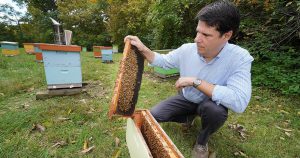Krispn Given, Apiculture Specialist, Purdue Univ. Department of Entomology
Maintains Purdue’s honey bee breeding program, manages the honey bee lab, conducts experiments and leads bee-related Extension activities.
Recognized for developing Indiana mite biters, a strain of honey bees bred with a particular behavioral trait that impacts overall survival.
Invited speaker to numerous scientific and beekeepers conferences each year, and has co-authored extension materials and several scientific papers in science journals.
When Krispn Given mentions he’s a honey bee researcher, the first question people ask him is whether he gets stung a lot. He doesn’t.
The bees are defensive sometimes but not aggressive, says Given, who is key to the entomology department’s beekeeping and pollinator protection programs. He is widely recognized for his innovative work in honey bee instrumental insemination and honey bee breeding.
Given grew up in the small town of Dayton, Indiana, where his father had two beehives. Young Krispn took care of the hives and earned money by selling the comb honey they produced.
Based on his love of classical piano and composing, he considered music training after high school but ended up working for 10 years as a chef and briefly in manufacturing. He then approached Greg Hunt, Purdue professor emeritus of entomology, who hired him in 2003 as a beekeeping technician to maintain the department’s colonies.
“I think he saw that I had a profound interest in nature and insects,” Given says of Hunt. “He became a mentor and good friend who gave me the opportunity to join him along this amazing scientific journey.”
Today Given is part of the lab of Brock Harpur, assistant professor of entomology. Given does molecular work in the winter but spends most of his time from early March to mid-November working with the colonies at the Entomology Field Operations Building west of campus. The apiary is located at this site, and the building provides support facilities for honey bee research.
Given was instrumental in developing a strain of bees called Indiana mite biters. Bees are dying globally because of a parasitic mite called Varroa destructor, he explains. Purdue bred bees that groom themselves free of mites and then bite them, killing the mites and reducing the deadly viruses they introduce into the colony. Purdue’s bee lab continues to improve the stock and research the genetics, ethology and evolution of this trait.
The mite-biter breeding program inspired serious beekeepers and micro-bee breeders to start a cooperative in 2015. Given is a former president of this Heartland Honey Bee Breeders Coop, and Purdue’s lab disseminates information and genetic stock to its members each year. They call it the annual “Instrumental insemination fest.”
He also teaches two courses, one course in queen rearing, the process beekeepers use to raise queen bees from young fertilized worker bee larvae. His advanced course on instrumental insemination, a method of controlled mating essential to honey bee research, attracts students from around the world. He learned how to successfully inseminate queen bees from Hunt, who learned the technique from the late Harry Laidlaw Jr., the father of honey bee genetics.
Given also was asked to write a book chapter on honey bee breeding for the book “Honeybee Medicine for the Veterinary Practitioner,” a request from Wiley he calls “a great honor.”
“Veterinary students have become interested in what we do because beekeepers who need antibiotics must get a prescription from their local veterinarian now,” he explains. “Bees get sick, too, and can be helped through medications, so the vets are learning about honeybee biology.”
Maintaining traits in honey bee breeding demands time and resources, says Given, who typically has an undergraduate helper in the lab. “You have to constantly select for the desired phonotypes or some beneficial traits could be lost through time,” he says.
His favorite part of the job is sharing what he’s discovered: “The biggest impact of my research and bee breeding is with entomology students — or prospective ones — but I’ve had several students through the years become interested in honey bee research or other aspects of insect research due to the success of our honey bee breeding program at Purdue.”
Behind the Research: Krispn Given – News & Stories (purdue.edu)







